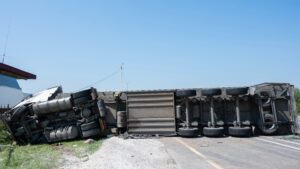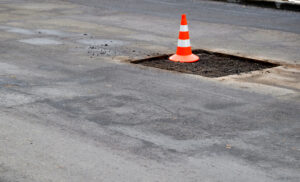How Do Flatbed Truck Accidents Occur?
Truck AccidentsFlatbed trucks are an important part of the transportation industry. They’re responsible for hauling oversized and irregularly shaped cargo that other types of trucks simply can’t manage. While their versatility makes them essential, flatbed trucks can also pose significant risks. Knowing how these accidents happen can help you recognize potential dangers and take steps to stay safe.
If you’ve suffered an injury in a flatbed truck accident, a Charleston truck accident lawyer can help you seek the compensation you deserve.
Cargo-Related Issues and Flatbed Truck Accidents
Flatbed trucks are vital in transporting large, irregularly shaped loads such as construction materials, heavy machinery, and industrial equipment. Unlike enclosed trailers, flatbeds rely heavily on how cargo is loaded and secured to ensure safe transit. Unfortunately, cargo-related issues are among the leading causes of flatbed truck accidents.
Serious Hazards
 Improperly secured cargo can shift or come loose while the truck is in motion, creating multiple dangers on the roadway. Unsecured cargo can fall off the truck, landing on the road and becoming a serious hazard for other drivers. In some cases, falling cargo may strike nearby vehicles directly, leading to severe damage, injuries, or even fatalities.
Improperly secured cargo can shift or come loose while the truck is in motion, creating multiple dangers on the roadway. Unsecured cargo can fall off the truck, landing on the road and becoming a serious hazard for other drivers. In some cases, falling cargo may strike nearby vehicles directly, leading to severe damage, injuries, or even fatalities.
Shifting loads can also destabilize the flatbed truck itself, making it harder for the driver to maintain control. This instability is particularly dangerous during sharp turns, on uneven terrain, or when the driver needs to stop suddenly.
The consequences of cargo-related accidents are far-reaching. Innocent drivers and passengers in other vehicles often bear the brunt, suffering from significant injuries and financial losses.
Complexities in Assessing Blame
Determining liability can be complex in such cases, as it may involve multiple parties, including the trucking company, cargo loaders, and the driver. If you’ve suffered an injury in an improperly secured cargo accident, after a truck accident attorney can handle the legal process and seek compensation.
Driver Fatigue and Its Impact on Flatbed Truck Accidents
Truck drivers are the backbone of the transportation industry, but the demanding nature of their work often pushes them to their limits. Federal regulations are in place to limit the number of hours drivers can operate their vehicles without rest, but these rules are not always adhered to. Driver fatigue remains a significant factor in flatbed truck accidents.
Fatigue impairs critical driving skills, such as reaction time, decision-making, and awareness of hazards. A fatigued driver may struggle to notice sudden changes in traffic conditions or respond appropriately to obstacles on the road. The effects of driving while fatigued aren’t that different from driving while drunk.
In extreme cases, fatigue can lead to micro-sleeps – brief, involuntary moments of sleep lasting a few seconds. While seemingly short, a micro-sleep can have catastrophic consequences when a heavy flatbed truck is involved. Even a momentary lapse in attention can result in devastating collisions, particularly at high speeds or in congested traffic.
A Symptom of Trucking Company Greed
The consequences of driver fatigue extend beyond individual mistakes; they reflect systemic issues within the trucking industry. Tight delivery schedules and employer pressure often compel drivers to push beyond safe limits.
A truck accident lawyer can help you hold the responsible parties accountable. Legal action can ensure you receive compensation for medical expenses, lost income, and other damages.
Mechanical Failures and Maintenance Neglect
Flatbed trucks are sophisticated machines that require regular maintenance to operate safely. However, maintenance neglect and mechanical failures are common contributors to flatbed truck accidents. When trucking companies or drivers fail to prioritize upkeep, the risks to other road users increase dramatically.
Common mechanical issues include brake malfunctions, tire blowouts, and steering system failures. A brake failure, for example, can make it impossible for a truck driver to stop in time to avoid a collision, especially when carrying a heavy load. Tire blowouts can cause a truck to swerve uncontrollably, endangering everyone on the road. Steering system problems can prevent a driver from maintaining control during tight maneuvers or high-speed driving.
Profits Over Safety
These mechanical failures often stem from inadequate or delayed maintenance. Trucking companies may cut corners to save time or reduce costs, while drivers may overlook warning signs of mechanical problems.
Regardless of the specific cause, accidents resulting from maintenance neglect are preventable. If you suspect a mechanical failure played a role in your accident, consulting with an experienced truck accident attorney is essential. An attorney can investigate the circumstances, identify any maintenance lapses, and hold negligent parties accountable.
Failing to Account for Poor Weather Conditions
Weather plays a significant role in many flatbed truck accidents. Rain, snow, ice, and fog can make driving conditions more challenging, even for experienced drivers. Due to their size, weight, and open cargo areas, flatbed trucks are particularly susceptible to the dangers of inclement weather.
 Wet or icy roads reduce traction, increasing the likelihood of skidding or losing control. High winds can make it difficult for a driver to maintain stability, especially when the truck carries a large or irregularly shaped load that catches the wind like a sail. Poor visibility caused by fog or heavy rain can prevent drivers from seeing obstacles or other vehicles in time to avoid a collision.
Wet or icy roads reduce traction, increasing the likelihood of skidding or losing control. High winds can make it difficult for a driver to maintain stability, especially when the truck carries a large or irregularly shaped load that catches the wind like a sail. Poor visibility caused by fog or heavy rain can prevent drivers from seeing obstacles or other vehicles in time to avoid a collision.
If weather conditions contributed to your accident, a truck accident lawyer can help you determine whether negligence played a role.
Human Error and Poor Judgment
Human error is a common factor in flatbed truck accidents. Drivers may make poor decisions that put themselves and others at risk. Speeding is a frequent issue, as some drivers try to meet tight delivery deadlines by traveling faster than is safe. Excessive speed reduces the driver’s ability to react to sudden changes and increases the severity of a collision.
Other instances of poor judgment include tailgating, aggressive driving, and failing to account for a flatbed truck’s unique handling characteristics. Unlike passenger vehicles, flatbed trucks require more time and distance to come to a complete stop. Drivers who follow too closely or fail to maintain a safe distance from other vehicles may be unable to avoid a collision in an emergency.
If a driver’s poor judgment caused your injuries, an attorney can help you hold them accountable.
Training and Experience Gaps
Flatbed truck drivers face unique challenges that require specialized training to operate their vehicles safely and handle the intricacies of transporting open cargo. Unfortunately, not all drivers receive the training they need before they’re sent out on the road. Trucking companies sometimes place unqualified drivers behind the wheel due to an ongoing labor shortage.
Inexperienced drivers may struggle to control the size and weight of their flatbed trucks, particularly in challenging scenarios such as navigating steep inclines, sharp turns, or congested traffic conditions. Without proper training, they may also lack the skills to secure cargo effectively, inspect their vehicle for potential issues, or respond appropriately to emergencies.
If you’ve been involved in an accident caused by an inexperienced flatbed truck driver, a truck accident attorney can help you hold the responsible parties accountable. Legal action allows you to seek compensation for your injuries and sends a message about the importance of adequate driver training.
Blind Spots and Limited Visibility
Blind spots are a significant safety concern for flatbed trucks, which have larger blind zones than passenger vehicles. These areas are located on both sides of the truck, directly behind it, and in front of the cab.
Limited visibility becomes even more problematic when the cargo on a flatbed truck obstructs the driver’s view. Large or improperly loaded items can block the side mirrors or rearview mirror, making it difficult for the driver to monitor their surroundings effectively. This lack of visibility creates a heightened risk for accidents, especially in busy traffic conditions or during lane changes and turns.
Improper Lane Changes and Merging
Flatbed trucks require significant space for maneuvers like lane changes or merging onto highways. Accidents can occur when drivers fail to signal their intentions or misjudge the amount of room needed. These sudden lane changes often leave other drivers with little time to react, resulting in collisions or dangerous evasive actions.
Improper merging is another frequent cause of accidents involving flatbed trucks. When a truck driver merges without checking for nearby vehicles or fails to account for the truck’s size and blind spots, they can force other drivers off the road or into a collision. These incidents are particularly common in urban areas with dense traffic or on highways with limited room for maneuvering.
If improper lane changes or merging led to your accident, an attorney can help build a strong case by gathering evidence such as witness statements, video footage, or driver logs. A truck accident lawyer will also work to ensure you receive compensation for your injuries, medical expenses, and other damages.
Overloading and Weight Distribution Issues
States place strict weight limits on flatbed trucks to ensure safe operation. The added weight can strain the brakes, tires, and suspension system when a truck is overloaded. Overloading also makes the truck more difficult to handle, increasing the risk of accidents.
Even when the total weight is within legal limits, improper weight distribution can cause problems. Unevenly distributed cargo can make the truck more prone to tipping over, especially when navigating curves or sudden stops.
Road Hazards and Construction Zones
 Flatbed trucks are particularly vulnerable to road hazards such as potholes, debris, and uneven pavement. These hazards can destabilize the truck, causing it to swerve or lose control. Construction zones pose additional challenges, as narrow lanes, sharp turns, and reduced speed limits require drivers to exercise extra caution.
Flatbed trucks are particularly vulnerable to road hazards such as potholes, debris, and uneven pavement. These hazards can destabilize the truck, causing it to swerve or lose control. Construction zones pose additional challenges, as narrow lanes, sharp turns, and reduced speed limits require drivers to exercise extra caution.
When truck drivers fail to adjust their driving to account for road hazards or construction zones, they put themselves and others at risk.
Negligent Trucking Companies
Trucking companies are responsible for ensuring the safety of their vehicles, drivers, and others on the road. Unfortunately, some companies prioritize profits over safety, leading to negligent practices that increase the risk of accidents.
One common example of negligence is failing to conduct thorough background checks on drivers. Hiring inexperienced or unqualified drivers puts everyone on the road at risk. Additionally, some companies neglect routine maintenance schedules, allowing trucks with worn brakes, damaged tires, or other mechanical issues to remain in operation. These oversights can result in mechanical failures that lead to devastating accidents.
Another concerning practice is encouraging drivers to violate federal hours-of-service regulations. Pushing drivers to work beyond their limits increases fatigue, impairs judgment, and reduces reaction time, all contributing to serious accidents.
If a trucking company’s negligence played a role in your accident, a truck accident attorney can investigate the company’s practices. Your attorney can build a compelling case and hold the company accountable by uncovering evidence such as maintenance logs, hiring records, and driver schedules.
Defective Equipment and Manufacturer Liability
Not all flatbed truck accidents result from driver error or maintenance neglect. In some cases, defective equipment is to blame. Faulty components such as brakes, tires, or steering systems can fail unexpectedly, creating dangerous situations for drivers and other road users.
When defective equipment causes an accident, the manufacturer of the faulty product may be held liable. To establish manufacturer liability, it must be proven that the defect existed when the product left the factory and that it directly caused the accident. This can involve analyzing the truck’s maintenance history, reviewing manufacturing records, and consulting engineering experts.
Proving these claims can be challenging, as manufacturers often have legal teams prepared to defend against liability claims. However, an experienced truck accident lawyer can guide you through this complex process, ensuring that all necessary evidence is gathered and presented effectively. You can seek compensation for your injuries by taking legal action and holding the manufacturer accountable for their role in the accident.
Let a Truck Accident Lawyer Fight for What’s Right
As you can see, flatbed truck accidents can happen for various reasons. Each accident is unique, and understanding the factors contributing to your injuries is essential for building a strong case. A Charleston personal injury lawyer can help you seek the compensation you need to recover and move forward. By holding the responsible parties accountable, you can protect your rights and help make roads safer. Contact an attorney as soon as possible for a free case review.
Nathan Hughey, an attorney and fourth-generation South Carolinian, founded Hughey Law Firm in 2007. Before that, he spent five years defending nursing homes and insurance companies. Leveraging his experience, he now advocates for those injured or wronged by such entities, securing over $220 million in verdicts and settlements.
